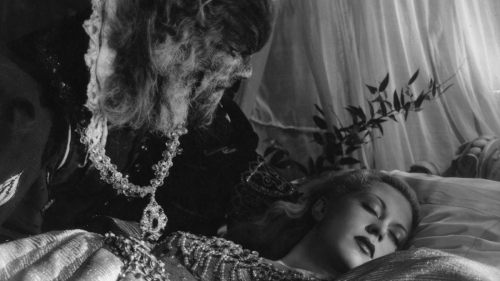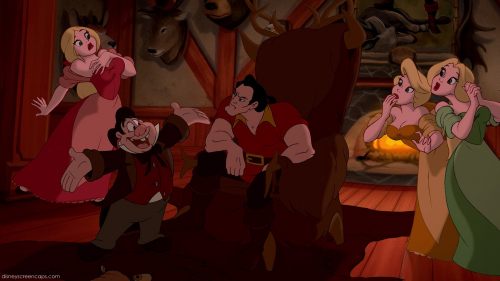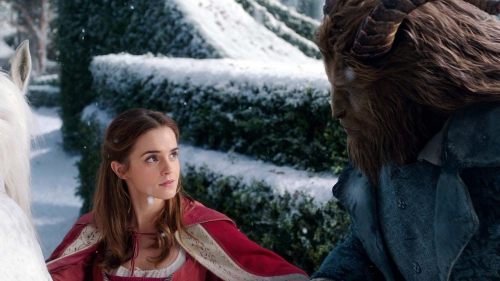EDWARD SCISSORHANDS And The Tragic Tale Of Beauty And The Beast
Instead of looking at your typical romance films, this month we're examining wacky love - or unconventional love if you want to attach a more eloquent label to it. Edward Scissorhands is far from typical; it's not your average love story, it is indeed somewhat wacky, and it's not typical Tim Burton - at least not in the contemporary sense. (It's also probably the only Johnny Depp film I actively enjoy.)
Edward Scissorhands perfectly captures Burton's distinct sensibilities, or at least the ones that made us fall for him in the first place. It's eccentric but not sickeningly quirky; it's impeccably designed with a blend of pastel idiosyncrasy and romantically dark details (you could call it Florida Goth); it is the story of an outcast, the story of accepting those who are different, of the insidiousness of mob mentality...but it's also a brutally charming love story in the vein of Beauty and the Beast. Framed as a melancholy fairy tale, Edward Scissorhands opens with an aging Kim (Winona Ryder), telling her granddaughter a bedtime story that explains how snow came to fall in their sunny little town.
From there we go back - back to the picture perfect neighborhood with its vibrant, boxy little homes and immaculately manicured lawns, obscuring the emptiness of the people who tend them. Kim's mother, Peg (Dianne Wiest), a persistent and persistently failing Avon lady, ventures to an isolated mansion atop a hill, where she finds Edward (Depp) - a young man created by a lonely old inventor (Vincent Price), who was given a brain, a heart, eyes, and all the valuable organic parts we so often take for granted, but his father couldn't give him one thing: hands. Instead, he has an array of scissors, and combined with his bondage-esque apparel and the scars marring his ghastly-pale face, he makes for a frightening figure upon first glance.
Peg isn't like the other women populating her banal little corner of suburbia - as a woman who makes a living by finding the beauty in everyone, she overlooks Edward's outward appearance to see the fragile, frightened, and naive boy within.
Much is made of the women in this community, all bored with their home lives - whether married or single - and zealously nosey, religiously clinging to gossip. They are just as lonely as Edward, and desperately eager for something new and different to devour. The women of the town fetishize and take advantage of Edward (following the rule that if it exists, someone will try to fuck it), exploiting what makes him different for their own personal gain - but Edward sees none of this because he only sees Kim, and beneath the halo of blonde hair and the macho boyfriend and normal teen extracurriculars, she is lonely and different, too. Perhaps she just doesn't know it yet, or perhaps she doesn't want to know it.
Edward Scissorhands doesn't follow the conventional love story model: the intimacy shared between Kim and Edward is brief, and unlike most fairy tales, this one has a tragic and soul-crushing ending. There is no actual coupling, no moment of respite, no period of bliss shared between the two before tragedy forces them apart. All they share is a single kiss and a tentative embrace, but it's more powerful than a lifetime of comfort and happiness together - to someone like Edward who sees the value in what we often take for granted, these fleeting moments are life-altering.
It's that aforementioned mob mentality that drives them apart, as Burton horrifically captures the way small-minded society so readily and rabidly turns on what is different and strange. What was once a shiny new novelty becomes a danger to those who willfully refuse to perceive Edward as anything but an object; instead, he is a toy they've grown sick of playing with, or a cute puppy that's gotten a little too rambunctious. What they fail to see is a human being, and so quick they are to oust him that they begin to mistake his genuine kindness for malice.
Unlike Beauty and the Beast, there is no magical ending where the beastly creature is unburdened by a declaration of love. He is forced to retreat to his lonely castle, where an aggressive confrontation with Kim's boyfriend, Jim (Anthony Michael Hall, essentially playing Gaston, giant biceps and all), turns deadly. After sharing one somber, beautiful moment with his princess and rescuing her from the real beast, Edward is left as we first found him: alone.
It's only when Kim concocts a story about Edward's valiant death that the small-minded people of the little town regret their actions. It takes a tragedy to inspire empathy. Perhaps more than a beautiful, deeply depressing love story, Edward Scissorhands is a cautionary horror tale about empathy (or lack thereof), more terrifying than any slasher or ghost story or relentless survival flick. When I was a kid, my parents let me watch horror movies and I was never scared of the boogeymen or the psycho killers or the specters. Edward Scissorhands was the first film to genuinely terrify me* - so much so that I couldn't sleep, and kept my parents awake all night because I could not understand why or how people could be so horribly cruel, how they could refuse to recognize the humanity in someone else, how they could not only abandon someone in need, but actively reject them from the community.
The end of the film delivers the answer to the mystery of the snow: it's Edward, alone on his hilltop, carving ice sculptures that cause something like snow to fall over the town each winter. Unlike those little people in that little town, Edward can empathize. He overlooks their flaws and embraces their humanity, and as a gift to all those lonely and painfully human little people, he gives them something beautiful - because everyone deserves beauty, even and especially those who behave so ugly.
Maybe what's most strange about the love in Edward Scissorhands isn't the Beauty and the Beast narrative, but the concept of empathy. It's something that shouldn't be a concept; it should be innate, but we find it so difficult to grasp. Empathy is exceptional, it is not typical, it is far from normal - it's strange. It is, after all, the root of love.



